Esta nota fue publicada originalmente el 17 de febrero de 2021.
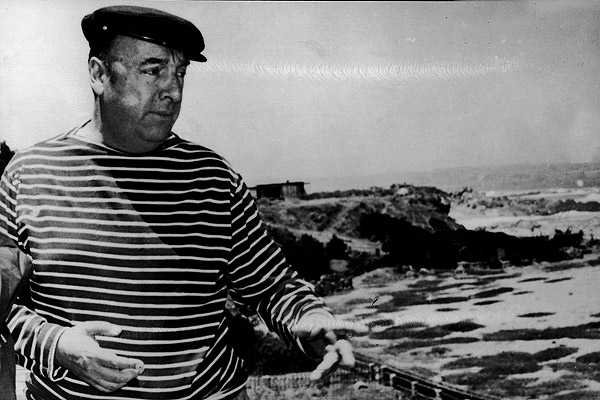
Pablo Neruda, poeta de saudades (Crédito: Web)
Leí en alguna parte que saudade es la palabra más bella que existe (aunque una vez le dije eso a una chica y me respondió que le sonaba a marca de jabón). Saudade, “dulce palabra de perfiles ambiguos”, significa una nostalgia profunda, sin esperanza; y mucho más: una soledad cósmica y metafísica. Es más azul que el blues, pues “azules son las montañas como ella”, en palabras de Pablo Neruda. Dicen que refleja la melancolía del pueblo más lleno de saudade que existe: el portugués, que canta su lenta tristeza resignada en los fados. Saudade, esa palabra blanca como un pez que se evade, que deja en la boca su temblor delicado…
I read somewhere that saudade is the most beautiful word in the world (although I once said that to a girl and she replied that it sounded like a brand of soap). Saudade, "sweet word of ambiguous profiles", means a deep nostalgia, without hope; and much more: a cosmic and metaphysical loneliness. It is bluer than the blues, for "mountains are blue like her", in the words of Pablo Neruda. They say it reflects the melancholy of the most saudade-filled people in existence: the Portuguese, who sing their slow, resigned sadness in the fados. Saudade, that white word like a fish that evades, leaving in the mouth its delicate trembling...
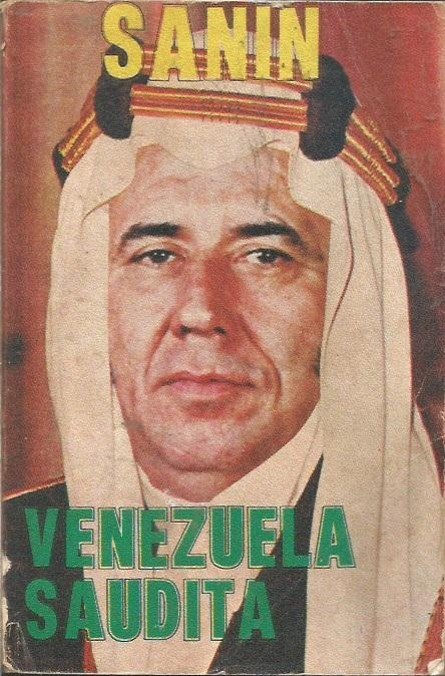
Crédito: Web
Es fácil sentir una nostalgia así por aquello que se llamó “La Venezuela Saudita”. Recientemente apareció una película llamada lacónicamente “CAP, dos intentos”, producida por Carlos Oteyza, cineasta que tiene a su disposición los inagotables archivos de Bolívar Films y CINESA, depositarios de tanta historia. La película recuerda las dos presidencias de Carlos Andrés Pérez (1974-1979 y 1989-93), pero la parte que desata la saudade en la gente es la del primer período: aquella demasiado breve Edad Dorada en que realmente parecía que la riqueza encerrada en pozos de petróleo sin fondo nos permitiría a todos los venezolanos, sin ni siquiera mancharnos las manos con el excremento del diablo, alcanzar y superar los sueños más audaces y delirantes que la ambición y la codicia pudieran concebir.
It is easy to feel such nostalgia for what was called "Saudi Venezuela". Recently, a film laconically called "CAP, two attempts" appeared, produced by Carlos Oteyza, a filmmaker who has at his disposal the inexhaustible archives of Bolivar Films and CINESA, repositories of so much history. The film recalls the two presidencies of Carlos Andres Perez (1974-1979 and 1989-93), but the part that unleashes saudade in people is that of the first period: that all too brief Golden Age when it really seemed that the wealth locked up in bottomless oil wells would allow all Venezuelans, without even staining our hands with the devil's excrement, to achieve and surpass the most audacious and delirious dreams that ambition and greed could conceive.
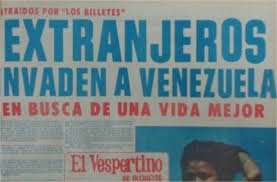
Crédito: Web
Conozco gente que ha llorado a moco y baba mientras veía esta película. Cómo no echar de menos aquel derroche de patanería en busca del refinamiento… y ahora que finalmente somos patanes refinados, resulta que ya no tenemos dinero, como teníamos en el 74. Ahora nos patotean en Colombia, Ecuador y Perú, adonde íbamos (aunque yo personalmente nunca fui) a restregarles los petrodólares a los cholos… Qué tiempos aquellos. Éramos felices, y sí lo sabíamos. Y eso fue antes de la fiesta de los raspacupos.
I know people who have cried their eyes out while watching this movie. How can we not miss that wastage of louts in search of refinement... and now that we are finally refined louts, it turns out that we no longer have money, as we had in '74. Now we are being bullied in Colombia, Ecuador and Peru, where we used to go (although I personally never went) to rub petrodollars on the cholos... Those were the days. We were happy, and we knew it. And that was before the "raspacupos" party.
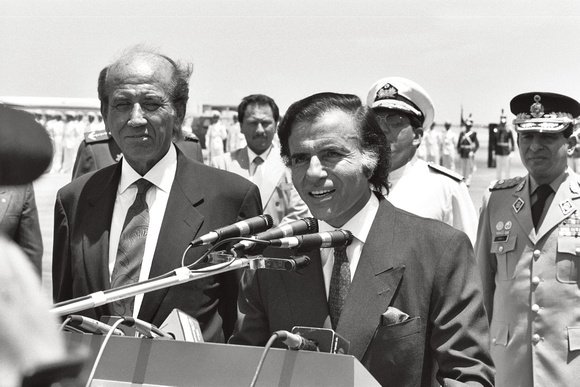
Carlos y Carlos - No sólo en las patillas se parecen (Not only the sideburns are alike). Crédito: web
Cómo no llorar recordando las becas Mariscal de Ayacucho (aunque a mí nunca me la dieron). Venezuela venía de una larga historia de oligarquías mezquinas, dictaduras despiadadas y pueblo hambreado. Gómez acabó con las guerras civiles, Pérez Jiménez nos llevó a la tan ansiada Modernidad que el Bagre nunca hubiera podido comprender… Y a partir del 74 El Gocho nos permitía hacer realidad el sueño de todo pícaro: vivir como rey sin que te obliguen a trabajar. El Gocho quería estar bien con todo el mundo: el Sha de Persia, Felipe González y su compinche el rey Juan Carlos, Fidel Castro, Mitterand, todos eran amigos suyos. Y respecto a las becas, ¿cuánta gente no se adelantó a su época aprovechando la beca para emigrar a algún país del Primer Mundo? ¿Cuánta gente sintió que tenía una deuda con la República? La ética no era el fuerte de la Venezuela Saudita.
How not to cry remembering the Mariscal de Ayacucho scholarships (although I never got one). Venezuela came from a long history of petty oligarchies, ruthless dictatorships and starving people. Gómez put an end to the civil wars, Pérez Jiménez took us to the longed-for Modernity that El Bagre would never have been able to understand... And from 1974 onwards, El Gocho allowed us to make every rogue's dream come true: to live like a king without being forced to work. El Gocho wanted to get along with everybody: the Shah of Persia, Felipe Gonzalez and his buddy King Juan Carlos, Fidel Castro, Mitterrand, they were all his friends. And regarding the scholarships, how many people did not get ahead of their time by taking advantage of the scholarship to emigrate to some First World country? How many people felt they owed a debt to the Republic? Ethics was not the forte of Saudi Venezuela.
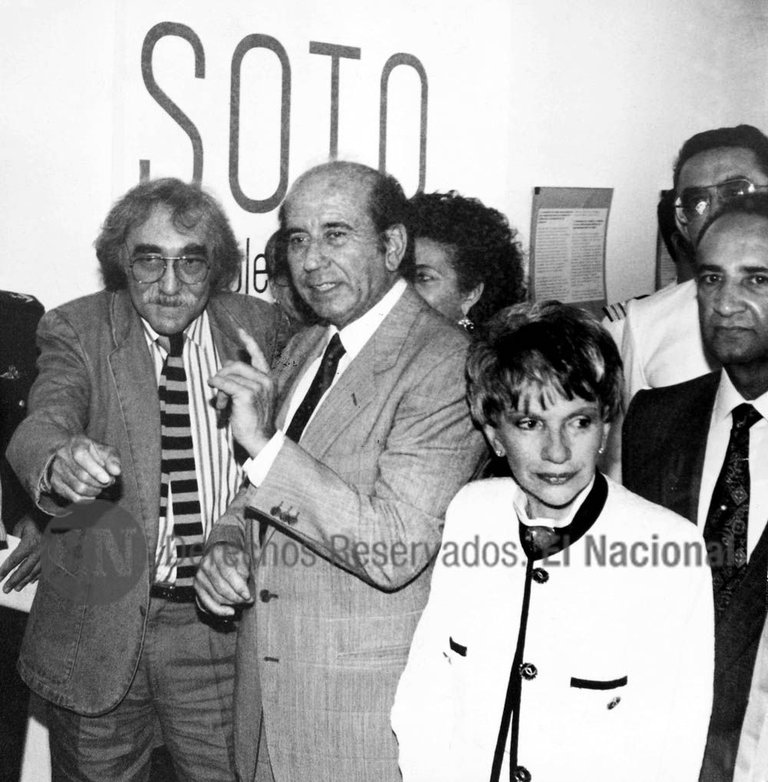
Crédito: El Nacional Web
Pero ¿se le puede pedir a un rentista que no disfrute de las mieles del ocio si es tan privilegiado que puede hacerlo? Si el arte es ocio y todo lo demás es negocio, pues mejor aún si hay ocio y también negocio. En aquellos tiempos tuvimos el Museo de Sofía y se creó el Sistema de Abreu. Se hicieron películas y otras obras faraónicas (Parque Central y su vecino Teatro Teresa Carreño) y algunas que se diseñaron entonces (como la nueva sede de la Biblioteca Nacional) después quedaron a medio hacer porque ya no hubo el billete masivo que tuvimos en el 74… y que empezó a desvanecerse en el 83.
But can we ask a rentier not to enjoy the sweetness of leisure if he is so privileged that he can do it? If art is leisure and everything else is business, it is even better if there is leisure and also business. In those times we had the Sofia Museum and the Abreu System was created. Movies and other pharaonic works were made (Central Park and its neighboring Teresa Carreño Theater) and some that were designed then (such as the new headquarters of the National Library) were left half done because there was no longer the massive ticket that we had in 74... and that began to fade in 83.
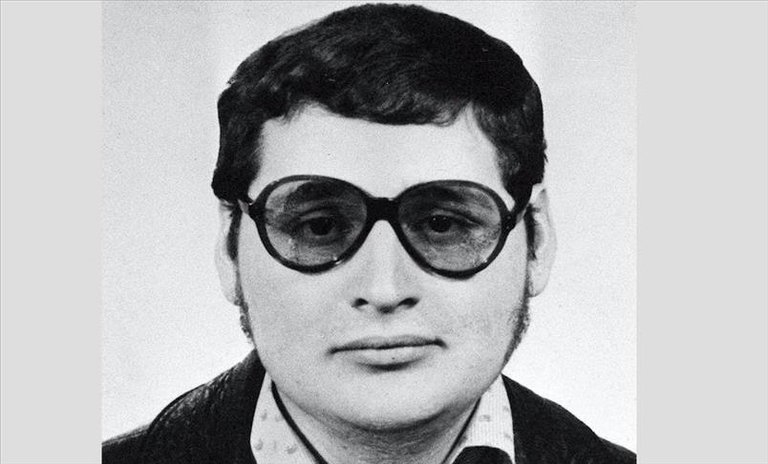
Carlos el tocayo en los 70 (Crédito: web)
¿Y aquella izquierda exquisita que aprovechó las becas Ayacuchas para conocer las cortes europeas? Mientras los adecos se iban a Miami o pasaban el calorón comiendo Big Macs en Houston, los cultivados pro-socialistas venezolanos aprendían a degustar vinos y quesos franceses con caviar en París, estudiaban cine en Londres, tomaban cursos con Foucault en la Sorbona y con Gadamer en Berlín. Uno de ellos, por cierto, era Carlos el Chacal, el imponderable Ilich Ramírez Sánchez, que en ese entonces estaba construyendo su leyenda. Recuerdo una escena en la película que hicieron muchos años después con Edgar Ramírez: en pleno secuestro de los ministros de la OPEP, Carlos habla con el representante de Venezuela. Éste le pregunta por qué escogió Carlos como nombre de batalla. La respuesta de Ilich me dejó estupefacto: era por Carlos Andrés Pérez, a quien, según la película, el implacable Chacal consideraba un verdadero revolucionario.
And what about that exquisite left that took advantage of the Ayacucho scholarships to visit the European courts? While the adecos went to Miami or spent the hot weather eating Big Macs in Houston, the cultivated pro-socialist Venezuelans learned to taste French wines and cheeses with caviar in Paris, studied cinema in London, took courses with Foucault at the Sorbonne and with Gadamer in Berlin. One of them, by the way, was Carlos the Jackal, the imponderable Ilich Ramirez Sanchez, who at that time was building his legend. I remember a scene in the movie they made many years later with Edgar Ramirez: in the middle of the kidnapping of the OPEC ministers, Carlos talks to the Venezuelan representative. The latter asks him why he chose Carlos as his battle name. Ilich's answer stunned me: it was because of Carlos Andres Perez, whom, according to the movie, the implacable Jackal considered a true revolutionary.
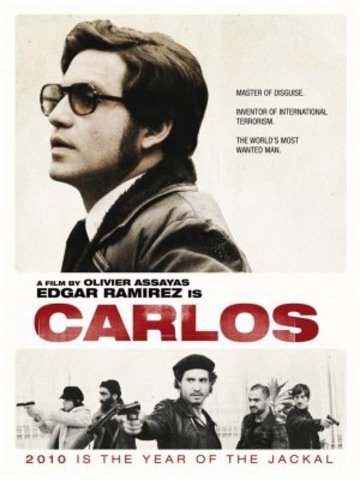
Afiche de la película "Carlos el chacal de la muerte"
Después, sería la crónica de cómo se perdió el Paraíso. En el 83 hubo un primer colapso financiero. La moneda se devaluó por primera vez en décadas, a la gente en Miami no les quisieron cambiar los cheques por un tiempo, y hubo un primer buen susto. Eso no impidió que el Gocho volviera en el 88, pero sí que Carlos Andrés lo hiciera en el 93. Porque el 27 de febrero del 89, el año del fin fukuyanesco de la historia, al colapso financiero se unió el estallido social. En Caracas, recuerdo, se esparció un miedo como no se había sentido desde el 23 de enero del 58. Ya íbamos aprendiendo el axioma fundamental: para hacer historia hay que pasar trabajo y ver escenas que después prefieres olvidar.
Later, it would be the chronicle of how Paradise was lost. In '83 there was the first financial collapse. The currency was devalued for the first time in decades, people in Miami could not cash their checks for a while, and there was a first scare. That did not prevent the Gocho from coming back in '88, but it did prevent Carlos Andres from coming back in '93. Because on February 27, '89, the year of the Fukuyanesque end of history, the financial collapse was joined by a social explosion. In Caracas, I remember, fear spread as it had not been felt since January 23, '58. We were already learning the fundamental axiom: to make history you have to sweat cold and see scenes that you would rather forget later.
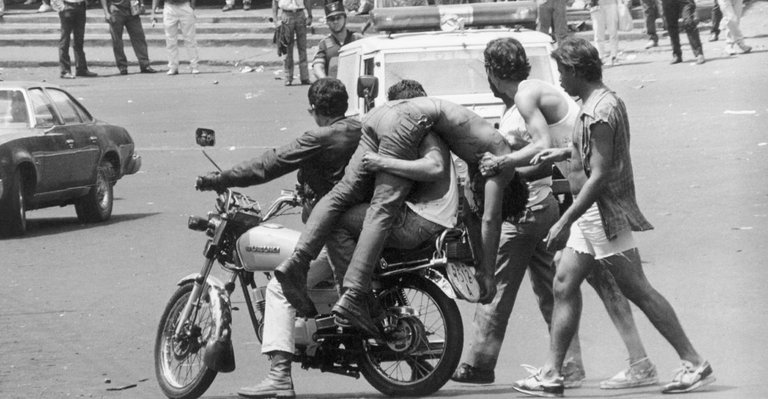
Legendaria foto de Frasso - Febrero 1989 - El Caracazo
Todo el culebrón escenificado alrededor de la caída del Gocho representó el fin de una era. Lo que se vio después, alguien (Rubén Monasterios, recientemente fallecido) dijo que se parecía mucho a la Alemania de los años 20-30: un presidente lleno de prestigio social pero demasiado viejo se debilita y deja en libertad a un exmilitar golpista que ha aumentado su popularidad en prisión y cuando sale de ella aparece como el ganador inevitable de las próximas elecciones. El resto, como dijo otro, es historia.
The whole soap opera staged around the fall of El Gocho represented the end of an era. What was seen afterwards, someone (the recently deceased Ruben Monasterios) said, looked a lot like Germany in the 20-30's: a president full of social prestige but too old weakens and releases a former military coup leader who has increased his popularity in prison and when he comes out of it appears as the inevitable winner of the next elections. The rest, as another said, is history.
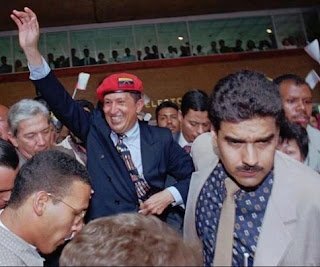
Crédito: web
Chávez no (sólo) es el cumplimiento de las peores pesadillas de los que preferirían ser europeos o gringos y no vivir en un país subdesarrollado como éste. El surgimiento de Chávez es el resultado de la abulia de la casta política que tomó el poder en el 58 y que después del Gocho no pudo volver a tener un líder popular. Y de la total ausencia de voluntad de poder de las izquierdas exquisitas, que son muy revolucionarias cuando la revolución ocurre en otra parte (mientras más lejos mejor), pero se achicopalan cuando suenan los tiros y rugen las masas enardecidas. Entonces aparecen como lo que son: burgueses blandengues y asustados.
Chávez is not (only) the fulfillment of the worst nightmares of those who would rather be Europeans or gringos and not live in an underdeveloped country like this one. The emergence of Chávez is the result of the abulia of the political caste that took power in 58 and that after the Gocho could never again have a popular leader. And of the total absence of will to power of the exquisite lefts, which are very revolutionary when the revolution takes place elsewhere (the farther away the better), but they shrink when the shots ring out and the masses roar in anger. Then they appear as what they are: soft and frightened bourgeoisie.
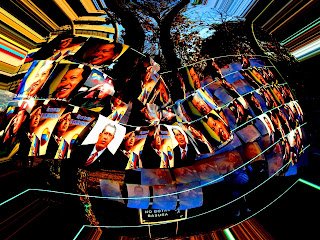
Triple distorsión. Crédito: Pedro Leonardo González
Entre 2005 más o menos y 2015, después de pasar los sustos de 2002-2004, vivimos una especie de retorno saudita, simbolizado por la proliferación de artefactos eléctricos y demás productos chinos. A partir de la muerte de Chávez, se cerró una trampa. Los enemigos del chavismo, tanto los desplazados como los blandengues, creyeron que Maduro era un pan comido, un mango bajito. En consecuencia, todos tuvimos que tragar arena bien gruesa mientras el hombre efectivamente maduraba y demostraba su valía. Si la historia la escriben los vencedores, habrá que ver entonces qué dirá la historia.
Between 2005 and 2015, more or less, after the scares of 2002-2004, we experienced a sort of Saudi return, symbolized by the proliferation of electrical appliances and other Chinese products. After Chavez' death, a trap was closed. The enemies of Chavism, both the displaced and the softies, believed that Maduro was a piece of cake, a ripe mango. Consequently, we all had to swallow thick sand while the man actually matured and proved his worth. If history is written by the victors, we will have to see what history will say.
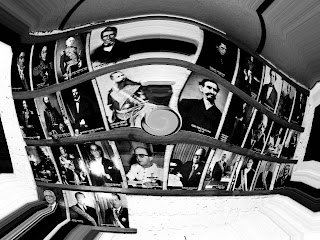
Crédito: Pedro Leonardo González
Mientras tanto, el año 2020 marca el fin de todas las eras anteriores y el doloroso nacimiento de la Nueva Normalidad. Los gobiernos y los entes financieros que los controlan están felices de tener a la gente encerrada por voluntad propia. En muchas partes, por cierto, hay levantamientos populares contra la cuarentena. El mundo ya cambió para siempre y va a seguir cambiando, sólo que cada vez más rápido. Ya viene el imperio de las criptomonedas, la inteligencia artificial de las cosas, el implante de chips… la evolución del Homo sapiens para convertirse en quién sabe qué… y Venezuela, de eso pueden estar seguros, volverá a ocupar el puesto que merece como una de las naciones más prósperas y pujantes del mundo. Antes, en el 74, nos faltó la ética, y ese endurecimiento sin perder la dulzura que sólo se adquiere pasando trabajo, enfrentando dificultades, nadando contra la corriente, inventando y/o errando. Algo habremos aprendido.
Meanwhile, the year 2020 marks the end of all previous eras and the painful birth of the New Normality. Governments and the financial entities that control them are happy to have people locked up of their own free will. In many places, by the way, there are popular uprisings against quarantine. The world has already changed forever and will continue to change, only faster and faster. The empire of cryptocurrencies, the artificial intelligence of things, the implanting of chips... the evolution of Homo sapiens to become who knows what... and Venezuela, of that you can be sure, will once again occupy the position it deserves as one of the most prosperous and thriving nations in the world. Before, in '74, we lacked ethics, and that hardening without losing the sweetness that can only be acquired by working hard, facing difficulties, swimming against the current, inventing and/or erring. We must have learned something.
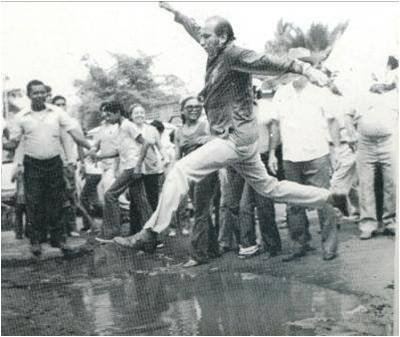
Legendaria foto de CAP saltando el charco. Crédito: web
Muchas gracias pordedicar su tiempo a esta lectura. Las fotos fueron escogidas por su valor histórico. Dos de ellas son de mi autoría / Thank you very much for the time you spent reading this text. Photographs were chosen for their historical value. Two of them were creations of mine.
Hola profesor, me gusto mucho su publicacion, de verdad usted comprendio facil el proceso de publicacion. pero le hago una observacion que he notado en sus ultimos dos publicaciones, y es que no las esta publicando dentro de nunguna comunidad, cada vez quye vaya a publicar ingrese en una comunidad que tenga relacion con su tema a tratar y publique dentro de esa comunidad, para que su contenido logre tener mayor visualizacion.
buenas vibras